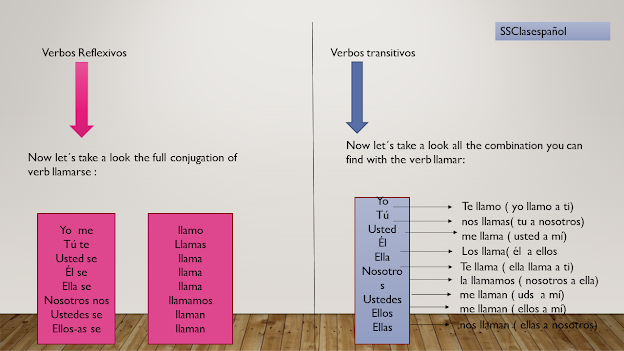Have you ever been confused about when to use a reflexive pronoun or an direct object pronoun ? Yes, I understand it can be frustrated.These pronouns are so similiar, they are only different in third singular or plural person ( se, lo/la/ ) it´s soooo confusing, right? .
In this post I am going to help you to make the difference when it´s a reflexive pronoun and object pronoun.
Manu Chao is here again to please us with another great song called "Me llaman calle".
First, let´s take a look to the lyrics.
 |
| Centro-Cartagena de Indias. Foto: SSClasespañol |
Me llaman calle, pisando baldosa
La revoltosa y tan perdida
Me llaman calle, calle de noche, calle de día
Me llaman calle, hoy tan cansada, hoy tan vacía
Como maquinita por la gran ciudad
Me llaman calle, me subo a tu coche
Me llaman calle de malegría*, calle dolida
Calle cansada de tanto amar
Voy calle abajo, voy calle arriba
No me rebajo ni por la vida
Me llaman calle y ése es mi orgullo
Yo sé que un día llegará, yo sé que un día vendrá mi suerte
Un día me vendrá a buscar, a la salida un hombre bueno
Pa toa* la vida y sin pagar, mi corazón no es de alquilar
Me llaman calle, me llaman calle
Calle sufrida, calle tristeza de tanto amar
Me llaman calle, calle más calle
Me llaman calle la sin futuro
Me llaman calle la sin salida
Me llaman calle, calle más calle
La que mujeres de la vida
Suben pa* bajo, bajan para arriba
Como maquinita por la gran ciudad
I love the lyric and the rythm of this song. As you already may notice when the singer say : " me llaman calle " He is using the verb "llamar" ( to call ) not the verb "llamarse " ( ones name is ) . The first version is not reflexive but the second does.
To evoid confusing what you need to do is to identify a reflexive verb from one that needs object pronouns. Look the following slides:
As you can notice in the slides above , many reflexive verbs has a transitive option but every time the verb is reflexive its pronouns never change and always mach with the subject and the conjugation of the main verb. A different thing happens with the transitive verbs. You can try to do examples with the other verbs as well. EG:- Luisa se levanta tarde los domingos vs mamá, ¿ Me levantas mañana a las 6 ?
- Luisa wakes up late on Sundays vs mom ¿ Can you wake me up at 6 ?
Now, Can you answer:
- ¿ Cómo te llamas ? (what´s your name)
- ¿ Cómo te llaman tus amigos? (how do your friends call you?)
Please write in the comment section.
Can you try more examples like mine?. If you have more questions or needs more examples don´t hasitate to leave your comment.
#spanishlessons #privatetutoring #spanish4foreigners #spanishincolombia #colombianas #spanishlanguage #lovespanish
NOTE: English is not my native language, please if you find any mistake, please let me know and I will correct it. Thanks.








No comments:
Post a Comment